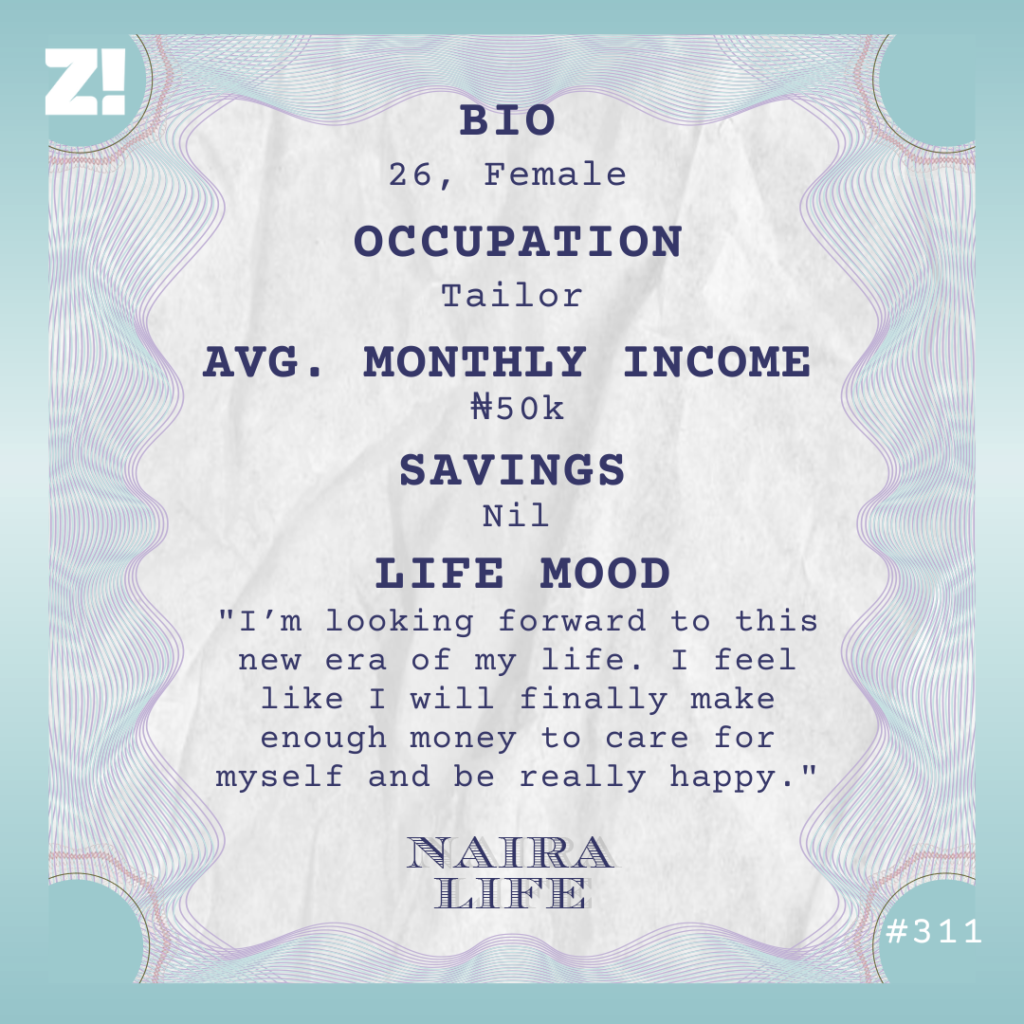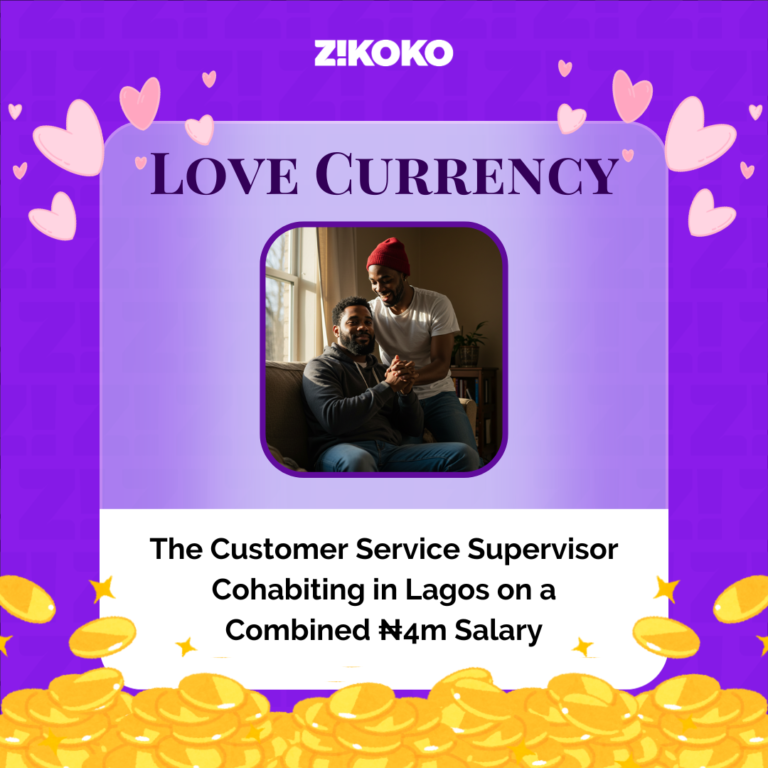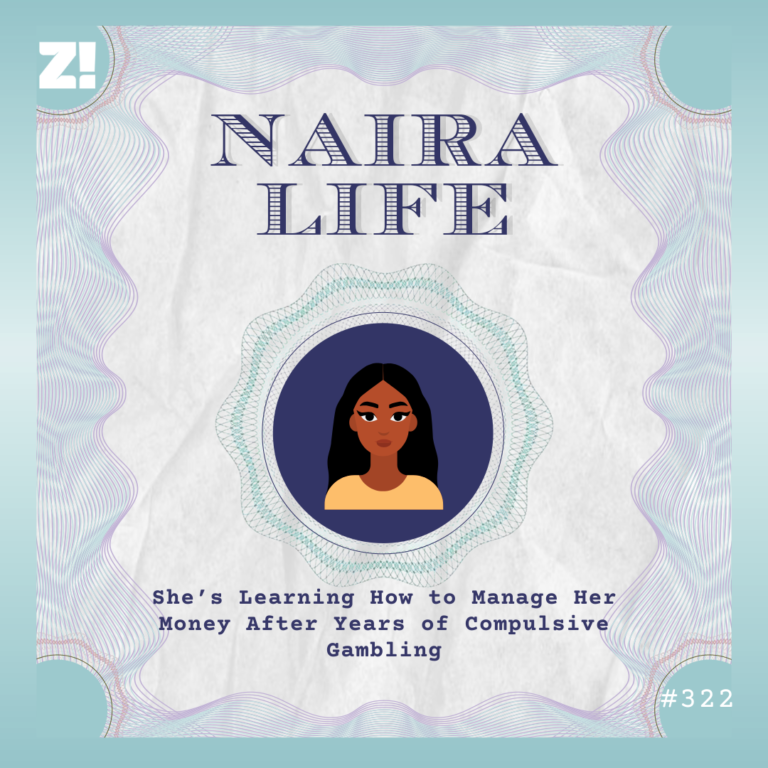Every week, Zikoko seeks to understand how people move the Naira in and out of their lives. Some stories will be struggle-ish, others will be bougie. All the time, it’ll be revealing.

What’s your earliest memory of money?
I didn’t have any reason to “hold” money until I was 10 years old and had just got into JSS 1. Getting into secondary school meant I had to take the bus and get snacks during lunch break. My parents gave me ₦50 — ₦10 for snacks and the rest to pay for the bus.
Speaking of your parents, what was the financial situation growing up?
I didn’t know much of what went on in my childhood. My parents were teachers, and I just knew I had a roof over my head and food in my stomach.
But I realised the true picture of our finances in my teens. We were lower middle class, and my mum handled most of the bills, including school fees, even though my father earned more. He just refused to step up to his responsibilities.
Although I could count on my mum, I started trying to make money from secondary school.
How did you do that?
In JSS 2, I made paper wallets and sold them. Almost everyone made paper wallets, but mine was different. I painted and drew on the wallets, and my classmates liked the additional details. I don’t remember how much I sold each, but I did it for a couple of months until I lost my own paper wallet with my money inside.
I tried something else in SS2 — I made birthday frames with glass and paper and designed them with paint. My dad was also artistic and had a big textbook about different types of crafts. I learned how to make the frames from the book and got my hands on leftover glass from my neighbours’ window louvres. I sold each for ₦100 for a term. They didn’t sell out as much as the paper wallets.
Was ₦100 good money, though?
I didn’t have a solid idea of money, so I sold based on vibes. In SS 3, I learnt how to sew. My mum paid a tailor, and I was an apprentice for about a year.
In 2015, I got into uni and started sewing clothes for money. I took my sewing machine to school and charged a ₦1k – ₦1500 flat rate to make dresses and tops. My earnings from this augmented my allowance — ₦10k/month — for my first two years in uni.
Then, in my 300 level, I pivoted to offering makeup services.
Did you also learn how to do makeup?
I didn’t. I’m quite creative and like doing things with my hands. I started experimenting with makeup in secondary school. I’d wear some to church and paint my nails, then I’d take them off before school on Monday.
So, I knew what I was doing when I started charging for makeup services at university. I didn’t charge too much, though. My rates were between ₦500 – ₦1k, and I also took on a few sewing gigs on the side.
I ran both businesses for the rest of uni. After I graduated in 2018, I did a three-month stint teaching at a school.
What was the pay like?
₦17k/month for a whole graduate. Plus, I taught five senior classes English language and literature.
Anyway, I moved on to my NYSC Place of Primary Assignment (PPA) in 2019. The monthly stipend was ₦19800, which increased to ₦33k a few months before my service year ended.
I took on a few tailoring gigs during service but mostly lived on my allawee and random cash handouts from relatives. So, I was comfortable.
In 2021, I moved to Lagos to upgrade my fashion skills. I couldn’t afford a fashion school, so I went to someone who had studied at one. I paid ₦150k, and I studied with her for a year.
I’m curious. What additional skills did you learn?
Before I made this move, my tailoring skills were what tailors call “free hand” and “cut and join”. During the training, I learnt “pattern drafting”, which is a more advanced process and a better way of making clothes.
I didn’t have an income during this period, but fortunately, I lived with a relative, which saved me feeding and accommodation costs.
I finished my training in 2022 and job-hunted for six months before I got a job in fashion. The job was supposed to be everything I’d wanted.
I’m guessing it wasn’t?
It wasn’t. It was a bridal company, and I was employed as a manager. My initial salary was ₦70k, which increased to ₦100k after eight months. That said, the load of responsibilities didn’t match the salary.
The job was so stressful and toxic. I was supposed to be a manager and pattern drafter, but I was also supervising all the workers, cutting garments, drafting patterns for the bridal gown embellishments, procuring materials, styling clients and working as my boss’ personal assistant.
Sometimes, I had to sew the gowns myself. On top of that, my boss was abusive and an all-round terrible person. My mental health was in shambles at that place.
I managed to stay at the job for one and a half years because I was fully responsible for myself at that point. My relative had relocated, and I had my ₦350k/year rent to consider, plus feeding and transportation. I finally left just before Christmas break in 2023.
Subscribe to the Money by Zikoko Newsletter for more stories like this. It’ll only take a minute.
Did you have any plans in place when you left?
My plan was to japa, and I thought it’d happen in 2024. For context, I started considering japa after I completed NYSC in 2020.
I wanted to go through the study route to earn a master’s degree in fashion design, but I realised it was out of reach. The only countries I knew were Canada, the UK and the US, and I couldn’t afford them. So, I didn’t put much thought into the process until I came across a work visa opportunity to Japan as a teacher in 2023.
This is how it works: Intending migrants apply for jobs at a Japanese company, and if they get the job, the employer applies for a certificate of eligibility to facilitate the visa and travel. The work contract and visa are valid for a year and can be renewed if the company is satisfied with the migrant’s work. If not, the migrant can look for a job with a different company or return to their home country.
Also, the employer doesn’t pay for the worker’s accommodation, but they support the process of securing one. You can’t do many things without a guarantor, especially getting an apartment, in Japan. So, the employer can help the migrant worker search for an apartment and the worker pays when they arrive.
Before I quit my job at the fashion company, I’d secured an offer to teach English in Japan. The salary was ¥230k/month (around ₦2.3m), and I was supposed to travel in March or April 2024. However, the company deferred my contract to 2025.
Why?
Apparently, I came in late during the hiring process, and it was too late for them to apply for the certificate. The problem was I’d already quit my job and moved back to my parents’ house. I was so weak and downcast.
It seemed like the opportunity had gone, so I tried to get another job offer in the country, but nothing came. I only pursued Japan because the process was easier and more affordable. The estimated cost for the visa, flight and accommodation is about ₦10m, which is still reasonable compared to other countries.
When I didn’t get another offer, I decided to wait for 2025 and hope the company would restart the process. I was in limbo for the rest of 2024, though. I didn’t look for jobs or upskill. I just took on small tailoring gigs occasionally and stayed home the rest of the time. My mind was just set on leaving Nigeria.
Right now, I make just enough money to survive. Sometimes, I make up to ₦50k/month; my only expenses are data and occasional transportation costs.
It’s 2025 now. Did the company restart the application process?
They did, thankfully. I have my visa, and I’m looking to travel in March. I’ve gotten the certificate of eligibility, paid the ₦12500 visa fee and raised the ₦10m I need for travel and accommodation through my mum. She took out a loan, and I’ll start paying it back as soon as I settle in Japan.
Ultimately, I don’t plan to return to Nigeria. I’ll just focus on working hard so my contract is renewed. Japan also feels like a structured country, and I think I’ll thrive there. However, their immigration policy isn’t friendly. They only offer permanent residence to foreigners after 10 years — no hope of attaining citizenship.
If I’m lucky enough to keep getting jobs for 10 years and become a permanent resident, I’ll probably look at other countries to settle in. But let me get to Japan first.
How would you describe your relationship with money?
I haven’t really made a lot of money in my life. I’ve generally played it very little and safe when it comes to money. I’m very basic; I don’t spend money on hair, nails, or other things like that. It doesn’t mean I don’t like those things; I just haven’t had enough to indulge. I’ve just been content with what I have.
That said, I’m looking forward to this new era of my life. I feel like I will finally make enough money to care for myself and be really happy. I’ll be able to buy hair, dress well, and do the things I haven’t been able to do for myself.
I’m excited because I probably couldn’t have envisioned a promising future in Nigeria so soon. When I earned ₦100k, all my savings went into paying rent. I couldn’t have unlocked any sort of financial freedom if I stuck with that. It would also likely take several years for me to earn up to ₦2m in Nigeria, but I’ll be making that when I move to Japan.
I see. Out of curiosity, are you nervous about starting afresh and alone in Japan?
Nah. I’m not worried about that. My only concern is meeting my financial goals and securing a contract for next year. It’ll take me about six months to fully repay my mum’s loan, and I should still be able to save about 20% of my income monthly. I can’t really say for sure until I arrive and see how things are.
But I hope I will have set aside a good safety net before my contract expires next year and I have to figure out the next steps.
Is there anything you want right now but can’t afford?
A lot of things o. I’m a girl, and I’d like to be able to afford nice hair and bags. I also have some health concerns I can’t sort out until I make good enough money or can afford health insurance. Hopefully, things would’ve changed by this time next year.
How would you rate your financial happiness on a scale of 1-10?
7. I have enough for my basic needs right now, but I want more. I want to buy property and do big things. I know things will improve after I japa.
If you’re interested in talking about your Naira Life story, this is a good place to start.
Find all the past Naira Life stories here.






